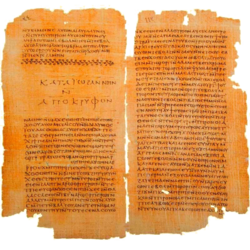Gospel of Thomas Quote
Jesus said, "If those who lead you say to you, 'See, the kingdom is in the sky,' then the birds of the sky will precede you. If they say to you, 'It is in the sea,' then the fish will precede you. Rather, the kingdom is inside of you, and it is outside of you. When you come to know yourselves, then you will become known, and you will realize that it is you who are the sons of the living father. But if you will not know yourselves, you dwell in poverty and it is you who are that poverty.
Gospel of Thomas
Jesus said, "If those who lead you say to you, 'See, the kingdom is in the sky,' then the birds of the sky will precede you. If they say to you, 'It is in the sea,' then the fish will precede you. Rather, the kingdom is inside of you, and it is outside of you. When you come to know yourselves, then you will become known, and you will realize that it is you who are the sons of the living father. But if you will not know yourselves, you dwell in poverty and it is you who are that poverty.
Related Quotes
About Gospel of Thomas
The Gospel of Thomas (also known as the Coptic Gospel of Thomas) is a non-canonical sayings gospel. It was discovered near Nag Hammadi, Egypt, in 1945 among a group of books known as the Nag Hammadi library. Scholars speculate the works were buried in response to a letter from Bishop Athanasius declaring a strict canon of Christian scripture. Most scholars place the composition during the second century, while some have proposed dates as late as 250 AD and others have traced its signs of origins back to 60 AD. Some scholars have seen it as evidence of the existence of a "Q source" that might have been similar in its form as a collection of sayings of Jesus, without any accounts of his deeds or his life and death, referred to as a sayings gospel, though most conclude that Thomas depends on or harmonizes the Synoptics.
The Coptic-language text, the second of seven contained in what scholars have designated as Nag Hammadi Codex II, comprises 114 sayings attributed to Jesus. Almost two-thirds of these sayings resemble those found in the canonical gospels and its editio princeps counts more than 80% of parallels, while it is speculated that the other sayings were added from Gnostic tradition. Its place of origin may have been Syria, where Thomasine traditions were strong. Other scholars have suggested an Alexandrian origin.
The introduction states: "These are the hidden words that the living Jesus spoke and Didymos Judas Thomas wrote them down." Didymus (Koine Greek) and Thomas (Aramaic) both mean "twin". Most scholars do not consider the Apostle Thomas the author of this document; the author remains unknown. Because of its discovery with the Nag Hammadi library, and the cryptic nature, it was widely thought the document originated within a school of early Christians, proto-Gnostics. By contrast, critics have questioned whether the description of Thomas as an entirely gnostic gospel is based solely on the fact it was found along with gnostic texts at Nag Hammadi.
The Gospel of Thomas is very different in tone and structure from other New Testament apocrypha and the four canonical Gospels. Unlike the canonical Gospels, it is not a narrative account of Jesus' life; instead, it consists of logia (sayings) attributed to Jesus, sometimes stand-alone, sometimes embedded in short dialogues or parables; 13 of its 16 parables are also found in the Synoptic Gospels. The text contains a possible allusion to the death of Jesus in logion 65 (Parable of the Wicked Husbandmen), but does not mention his crucifixion, his resurrection, or the Last Judgment; nor does it mention a messianic understanding of Jesus.
The Coptic-language text, the second of seven contained in what scholars have designated as Nag Hammadi Codex II, comprises 114 sayings attributed to Jesus. Almost two-thirds of these sayings resemble those found in the canonical gospels and its editio princeps counts more than 80% of parallels, while it is speculated that the other sayings were added from Gnostic tradition. Its place of origin may have been Syria, where Thomasine traditions were strong. Other scholars have suggested an Alexandrian origin.
The introduction states: "These are the hidden words that the living Jesus spoke and Didymos Judas Thomas wrote them down." Didymus (Koine Greek) and Thomas (Aramaic) both mean "twin". Most scholars do not consider the Apostle Thomas the author of this document; the author remains unknown. Because of its discovery with the Nag Hammadi library, and the cryptic nature, it was widely thought the document originated within a school of early Christians, proto-Gnostics. By contrast, critics have questioned whether the description of Thomas as an entirely gnostic gospel is based solely on the fact it was found along with gnostic texts at Nag Hammadi.
The Gospel of Thomas is very different in tone and structure from other New Testament apocrypha and the four canonical Gospels. Unlike the canonical Gospels, it is not a narrative account of Jesus' life; instead, it consists of logia (sayings) attributed to Jesus, sometimes stand-alone, sometimes embedded in short dialogues or parables; 13 of its 16 parables are also found in the Synoptic Gospels. The text contains a possible allusion to the death of Jesus in logion 65 (Parable of the Wicked Husbandmen), but does not mention his crucifixion, his resurrection, or the Last Judgment; nor does it mention a messianic understanding of Jesus.
